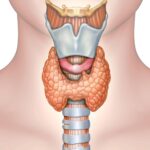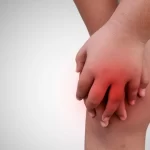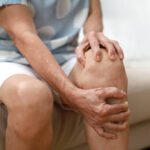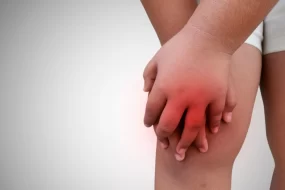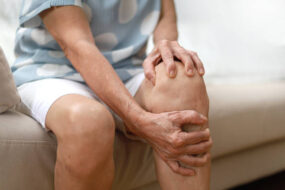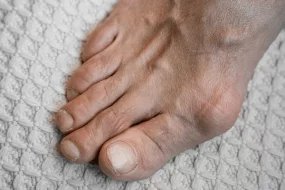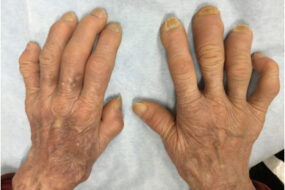- Home
- INTERNAL MEDICINE
- Hiccups

Hiccups, or singultus, are involuntary, repetitive contractions of the diaphragm followed by the sudden closure of the glottis, which produces the characteristic “hic” sound. While often benign and self-limiting, persistent or intractable hiccups may indicate underlying medical conditions that require evaluation and treatment.
Pathophysiology
The exact mechanism behind hiccups is not fully understood, but they are believed to involve a reflex arc that includes:
- The Afferent Pathway: Comprising the phrenic nerve, vagus nerve, and sympathetic chain.
- The Central Processing Unit: Located in the medulla and reticular formation of the brainstem.
- The Efferent Pathway: Involving the phrenic nerve, which innervates the diaphragm.
Hiccups can be triggered by irritation or stimulation at any point along this reflex arc, leading to diaphragm spasms.
Classification
Hiccups are classified based on duration:
- Acute Hiccups: Lasting less than 48 hours.
- Persistent Hiccups: Lasting more than 48 hours but less than 1 month.
- Intractable Hiccups: Lasting more than 1 month, often requiring thorough investigation and treatment.
Etiology
Numerous causes can lead to hiccups, which can be grouped into three main categories:
- Physiological Causes: Often responsible for acute hiccups.
- Gastrointestinal Distension: Overeating, consumption of carbonated beverages, or swallowing air.
- Temperature Changes: Sudden ingestion of hot or cold food/drinks.
- Alcohol or Carbonated Drinks: Can irritate the diaphragm or cause gastric distention.
- Excitement or Emotional Stress: Can activate the autonomic nervous system.
- Pathological Causes: More common in persistent or intractable hiccups.
- Central Nervous System (CNS) Disorders: Stroke, brain tumors, multiple sclerosis, encephalitis, traumatic brain injury.
- Gastrointestinal Diseases: Gastroesophageal reflux disease (GERD), hiatal hernia, peptic ulcer disease, pancreatitis, or liver abscess.
- Cardiovascular Conditions: Myocardial infarction, pericarditis, or aortic aneurysm.
- Respiratory Issues: Pneumonia, pleurisy, asthma, or pulmonary embolism.
- Metabolic and Endocrine Disorders: Diabetes mellitus (especially with autonomic neuropathy), uremia, hyponatremia, hypocalcemia.
- Infections: Meningitis, hepatitis, or malaria.
- Malignancies: Thoracic or abdominal tumors that irritate the diaphragm or phrenic nerve.
- Drug-Induced Causes: Certain medications can trigger hiccups.
- Central Nervous System Agents: Benzodiazepines, opioids, barbiturates.
- Anesthesia and Chemotherapy Drugs: Including dexamethasone, cisplatin, and cyclophosphamide.
- Dopaminergic Drugs: Such as levodopa.
- Antibiotics: Especially macrolides like azithromycin, which may cause gastric irritation.
Clinical Evaluation
A thorough evaluation is necessary for persistent or intractable hiccups to identify any underlying conditions:
- History: Assess the duration, frequency, and potential triggers of hiccups. Review medical history, including CNS disorders, gastrointestinal symptoms, and drug use.
- Physical Examination: Focus on the abdomen, chest, and neurological system. Look for signs of respiratory or cardiac issues, and assess for abdominal tenderness or organomegaly.
- Diagnostic Investigations: Based on suspected etiology.
- Blood Tests: Assess electrolytes, renal and liver function, glucose, and infection markers.
- Imaging: Chest X-ray to rule out thoracic conditions. Abdominal ultrasound or CT may be warranted if gastrointestinal causes are suspected.
- Endoscopy: Upper gastrointestinal endoscopy may be indicated for suspected GERD, esophagitis, or ulcers.
- MRI/CT of the Brain: If CNS involvement is suspected, especially in cases with accompanying neurological signs.
Management
Management depends on the duration and underlying cause of hiccups:
- General Measures: Often used for acute hiccups.
- Breathing Techniques: Holding the breath, breathing into a paper bag, or performing the Valsalva maneuver.
- Pharyngeal Stimulation: Swallowing cold water, gargling, or swallowing granulated sugar.
- Positional Maneuvers: Kneeling and pulling the knees to the chest or leaning forward can help.
- Pharmacological Treatment: Considered for persistent or intractable hiccups.
- Chlorpromazine: Considered the drug of choice for intractable hiccups. Dosage typically starts at 25-50 mg orally, 3-4 times daily.
- Metoclopramide: A prokinetic agent that may be helpful, especially if gastrointestinal causes are suspected. Dosage: 10-20 mg orally, 3-4 times daily.
- Baclofen: A muscle relaxant used when hiccups are thought to be of central origin. Dosage: 5-10 mg orally, 3 times daily.
- Gabapentin: An anticonvulsant used for its neuromodulatory properties. Dosage: 300 mg, 3 times daily.
- Amitriptyline: An antidepressant with central nervous system effects, considered in some cases.
- Invasive Interventions: Reserved for refractory cases.
- Phrenic Nerve Block: Local anesthetics or surgical intervention to interrupt the reflex arc.
- Vagus Nerve Stimulation: Emerging therapy for intractable cases.
- Acupuncture: Has shown some efficacy in case reports.
Complications
Prolonged hiccups can lead to complications such as:
- Insomnia and Fatigue: Disruption of sleep due to continuous hiccups.
- Malnutrition and Weight Loss: If associated with gastrointestinal conditions.
- Psychological Distress: Persistent symptoms can cause anxiety, depression, and social embarrassment.
- Aspiration Pneumonia: In cases with impaired swallowing.
Prognosis
- Acute Hiccups: Usually self-limiting and resolve without specific treatment.
- Persistent/Intractable Hiccups: May indicate a serious underlying condition; early identification and treatment of the cause can significantly improve outcomes.


